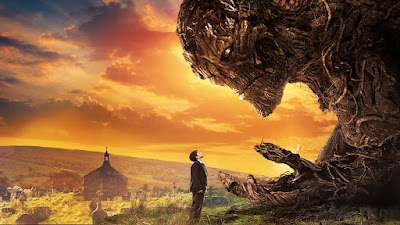A Monster Calls is abandonment trauma rendered as effects-heavy fantasy: the sense of loss we feel is not quite the one we're supposed to feel. The Spanish director J.A. Bayona (The Orphanage, The Impossible) has enlisted author Patrick Ness to adapt his own book about one Callum O'Malley (played here by newcomer Lewis MacDougall), a bullied schoolboy living with a terminally ill mother (Felicity Jones) in the furthest reaches of the English countryside. One night at 12.06am, when the sleepless Callum is doodling, the giant yewtree in the cemetery beyond his bedroom window suddenly uproots itself and marches towards the house, threatening - in the gruff tones of Liam Neeson - to tell our boy three stories on three successive nights, eliciting a fourth in turn from the listener. Given that these tales arrive in the form of Useful Moral Lessons - "there is not always a good guy, nor is there always a bad guy; most people are somewhere in between" - the tree emerges as somewhere between a tutor and a therapist, without the sense of humour.
He (it?) is quite the sight, however. Bayona's first movies have established him as something like a supply-teacher Guillermo del Toro, a not ungifted fabulist with a particular facility for integrating substantial handfuls of pixels into the design of his dark bedtime stories. This Monster looks like a gnarly offshoot of del Toro's Faun from Pan's Labyrinth, and he forms a workable little-and-large pairing with the kid: instead of climbing up into the tree's branches to hear his tales, Cal finds himself plucked out of his bedroom window and cradled in a woody fist. With The Impossible, Bayona bequeathed the world its latest Spider-Man (in Tom Holland), and it's clear he has an eye for durable young performers. MacDougall has a fierce, heavy-lidded look that suggests a boy finding out about life the hard way - overhearing snippets of fraught adult conversation, watching mum waste away before his eyes. The young lead deserves extra brownie points for maintaining his expression of cowed awe whenever the tree shows up - because the monster calls to bore us to sleep with these fairytales, all of which seem to revolve around how amazing the tree is.
Having a catalyst who's a big barky bore is one problem with Bayona's film; another is that the reality from which Callum longs to escape never really convinces. Mother and son occupy a small corner of England that looks for all the world like a set - or massive green screen - and which doesn't ever connect with the terraced streets on which the boy's grandmother (Sigourney Weaver, with slightly off Limey accent) is shown to live. Weaver is typically imposing, and she has one great scene in which she acknowledges the rage coursing down this bloodline by helping the kid trash her own front parlour, but still: were there really no comparably bankable British actresses available to play this part? At every turn, A Monster Calls betrays signs that it had too much damn money at its disposal, that it felt compelled to blow up Callum's humdrum normality, his everyday tragedy, into the business of blockbusting Marvel-era multiplex product. A damp seaside day out with dad (Toby Kebbell) thus finds itself lavished with a full orchestral score; it climaxes with a meal in a Chinese restaurant that could conceivably house five-sevenths of the Chinese population.
You can goggle or be knocked out by the spectacle, sure - the early reviews suggest many trusted friends and colleagues have - but to these eyes, Bayona never gets close to achieving the intimacy he was surely aiming for, or which Ness surely achieved the minute his book started to be imparted as bedtime fare: the film's just too big for anything like that, and even when the camera does deign to get up close, in those scenes between Jones and MacDougall, the space around the players looks perilously plasticky, virtual, hollow even. (Bayona's next gig will be directing the Jurassic World sequel; this feels like a rehearsal.) Grief is such that I couldn't honestly predict the effect A Monster Calls might have on anybody going through a similar predicament: the film might be a source of consolation, but then again, it could just as easily be a chore, not least as it resembles so many of the overprogrammed smash-'em-ups currently bouncing around the multiplex. "I want it to be over!", Callum hollers at the point of acceptance Ness's five-stage narrative is building towards; grown-ups may express something similar in the face of Bayona's bludgeoning methodology.
A Monster Calls opens in cinemas nationwide from New Year's Day.

No comments:
Post a Comment